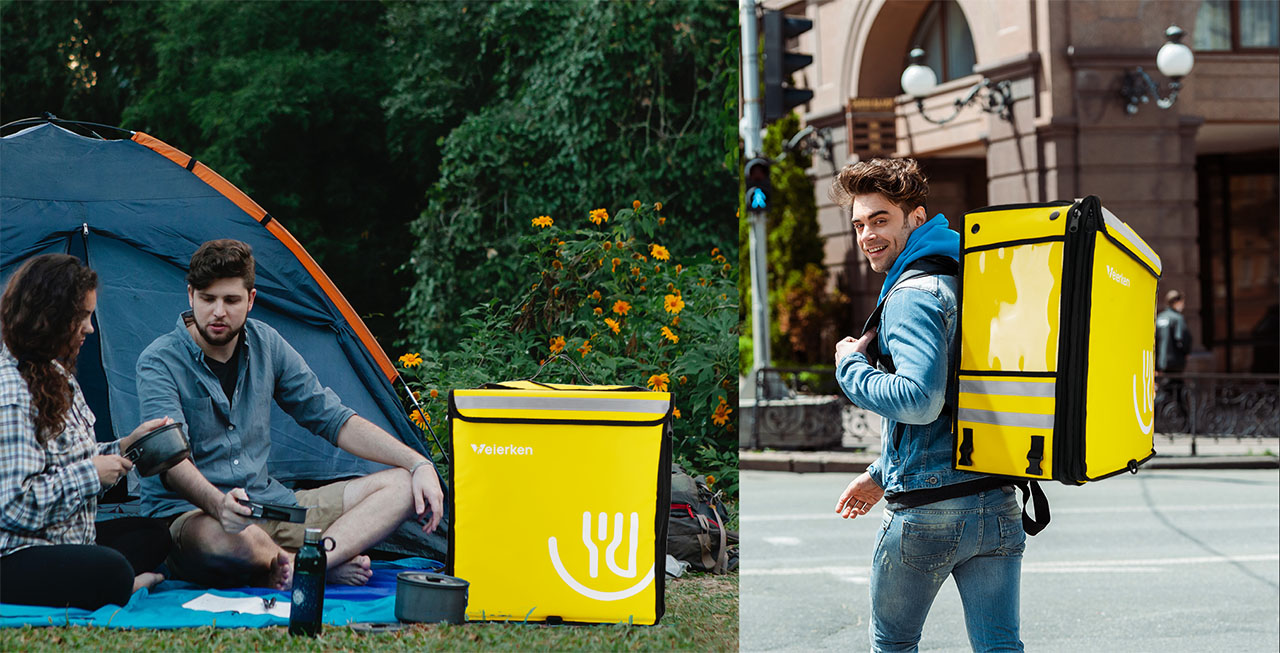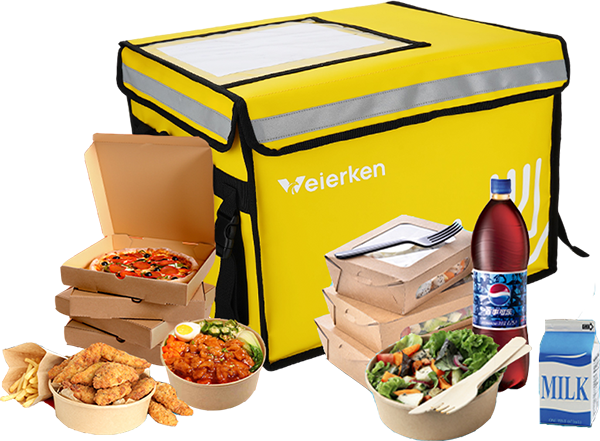How to make a choice between thermal bag and cooler bag? People may confuse with them, let’s explore the differences between thermal bags and cooler bags, focusing on their design, materials, and functionality. It provides a detailed comparison to help readers understand which type of bag is best suited for various activities and needs. Thermal bags are described as lightweight and versatile, ideal for short-term temperature maintenance, both for hot and cold items. They are typically used for grocery shopping, daily commutes, or transporting medical supplies . In contrast, cooler bags are designed for long-term cold retention, making them perfect for outdoor activities, sports events, and long-distance travel. Hereby, we highlight key aspects such as temperature control capabilities, size and capacity, durability, and portability, guiding readers on how to choose the right bag bsed on their specific requirements.
Keywords: Food delivery bag, Picnic bag, Outdoor activities bag.
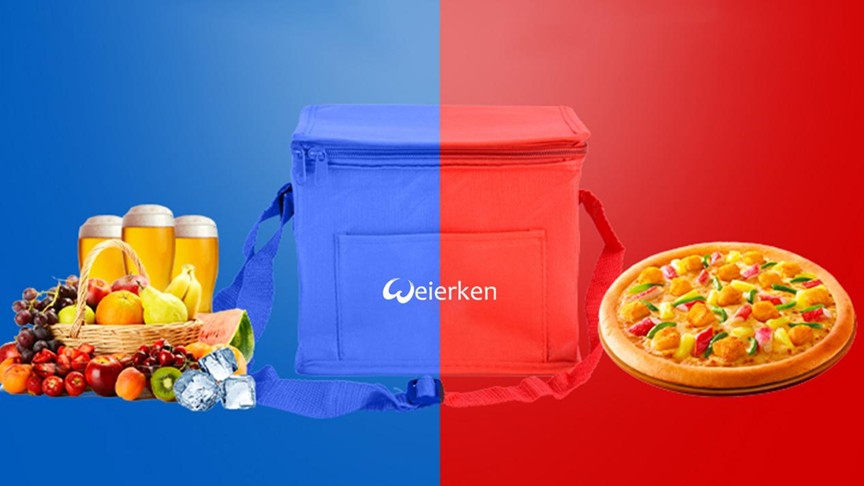
Thermal/Cooler Bag’s differences
When it comes to keeping food and drinks fresh during outdoor activities or daily commutes, two types of bags often come to mind: thermal bags and cooler bags. While both serve the purpose of preserving the temperature of your items, there are distinct differences between these two options. Cooler bags and thermal/insulated bags are two types of bags primarily used for the purpose of keeping the tem perature of food and beverages constant. Although they may appear to be similar at first glance, there are significant differences between the two. In this article, we will explore these differences, their functionalities, and the various factors that make them distinct from each other. In this article, we’ll explore the key distinctions, so you can choose the best option for your specific needs.
Understanding Thermal Bags Definition and Functionality
Thermal bags, also known as insulated bags, are designed primarily to maintain the temperature of their contents. They are typically made with insulating materials like foam and reflective liners to prevent heat transfer. These bags are versatile and can be used in various settings, from grocery shopping to work commutes.
Thermal bagswork by minimizing heat transfer between the inside of the bag and the external environment. The reflective lining of a thermal bag reflects heat radiation back into the bag, keeping hot items warm. When used for cold items, the lining helps retain the cold by preventing warm air from entering. The bags usually have a zippere d or Velcro closure to create a seal, further preventing the exchange of air and maintaining the desired temperature.
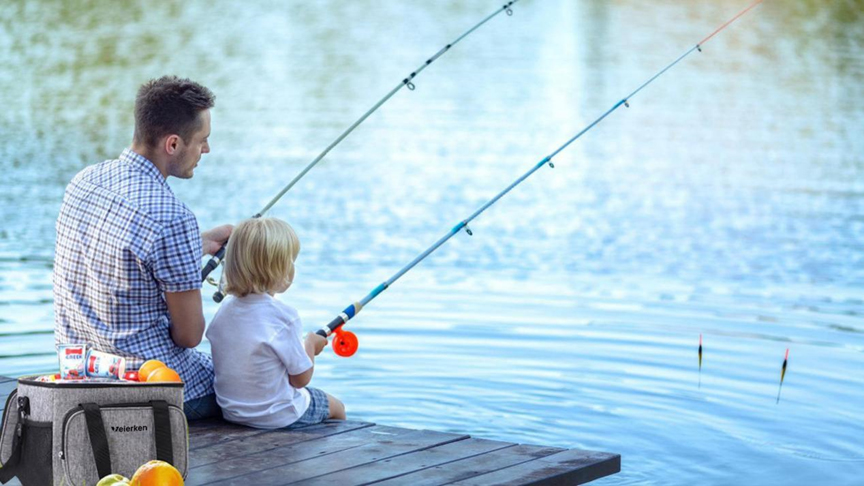
Fishing with Thermal Bag
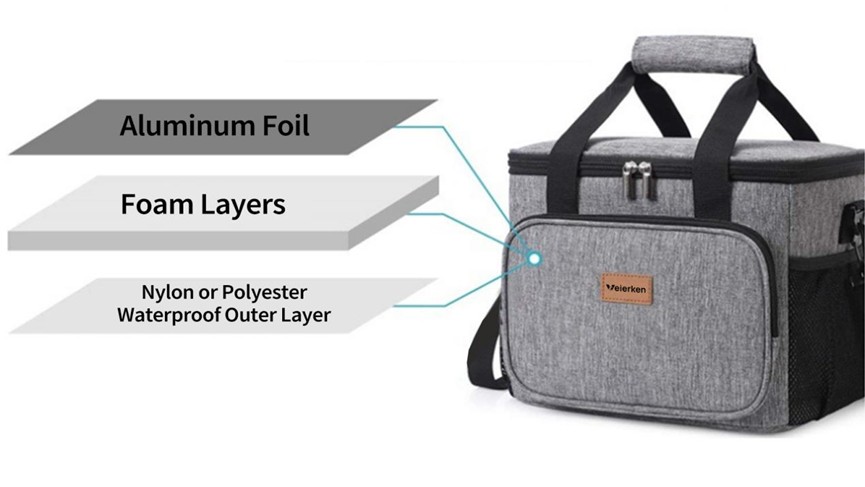
Thermal Bag’s Materials
The construction of thermal bags includes:
•Insulated Lining: Typically made of aluminum foilor another reflective material that reflects heat away.
•Foam Layers: These layers provide additional insulation to keep contents at the desired temperature.
•Waterproof Outer Layer: Often made of nylon or polyester, this layer protects the contents from moisture.
Uses
Thermal bags are ideal for:
- Grocery Shopping: They are commonly used to transport perishable groceries, such as frozen foods or hot takeaway meals, keeping them at the desired temperature until they reach their destination.
- Daily Commutes: Storing lunch and snacks at a consistent temperature.
- Medical Supplies: Transporting medications that require specific temperatures.
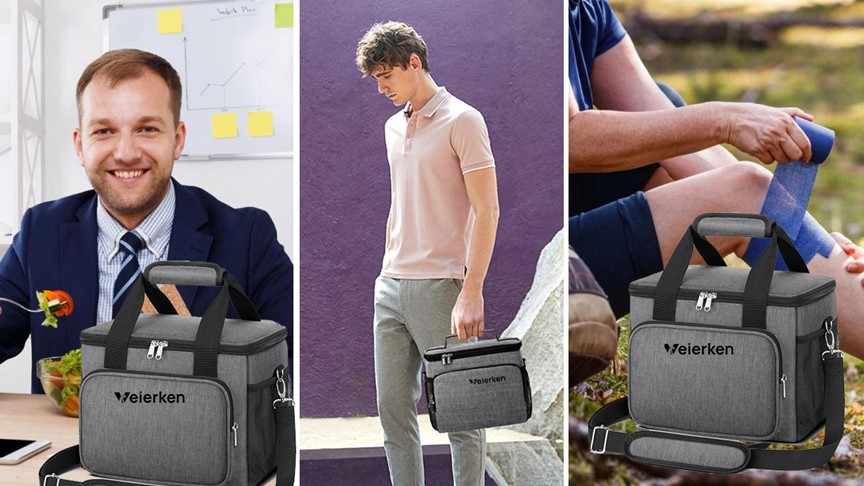
Thermal Bag Different Scenario
Pros and Cons of Thermal Bags
Pros:
- Lightweight and easy to carry.
- Reusable and often foldable for convenient storage.
- Effective for short-term temperature maintenance.
- Suitable for both hot and cold items.
Cons:
- Limited insulation duration; not ideal for long periods.
- May not maintain a consistent temperature in extreme conditions.
- Typically not as robust or durable as cooler bags.
Exploring Cooler Bags Definition and Functionality
Cooler bags are specifically designed for longer-term temperature control. They are typically larger than thermal bags and have thicker insulation to keep ice frozen for extended periods. Cooler bags are great for picnics, camping trips, and beach days where maintaining a cold environment is crucial.
Cooler bags function by using layers of insulation that slow down the transfer of heat from the outside environment to the inside of the bag. The insulation is often made of foam or similar materials that trap air, creating a barrier that keeps the cold in and the heat out. Many cooler bags also feature a waterproof liner that prevents melted ice or condensation from leaking out.
To enhance their cooling capability, cooler bags are usually used with ice packs or ice blocks, which help maintain a low internal temperature for a longer period.
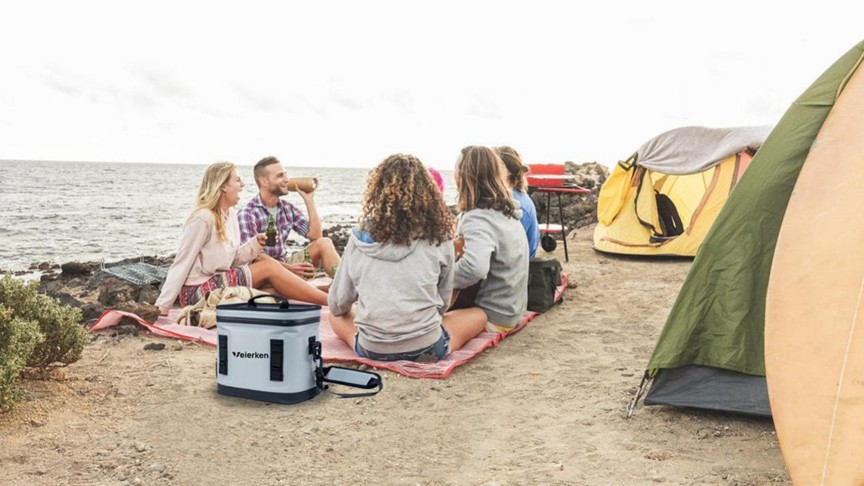
Camping with Cooler bag
Materials Used
Cooler bags usually feature:
- Sealed Compartments:To prevent leaks and ensure that wet items don’t affect dry ones.
- Thick Insulation: Made of foamor gel packs that can be frozen before use.
- Rugged Exterior:Often made of heavy-duty materials like vinyl-coated polyester for durability.
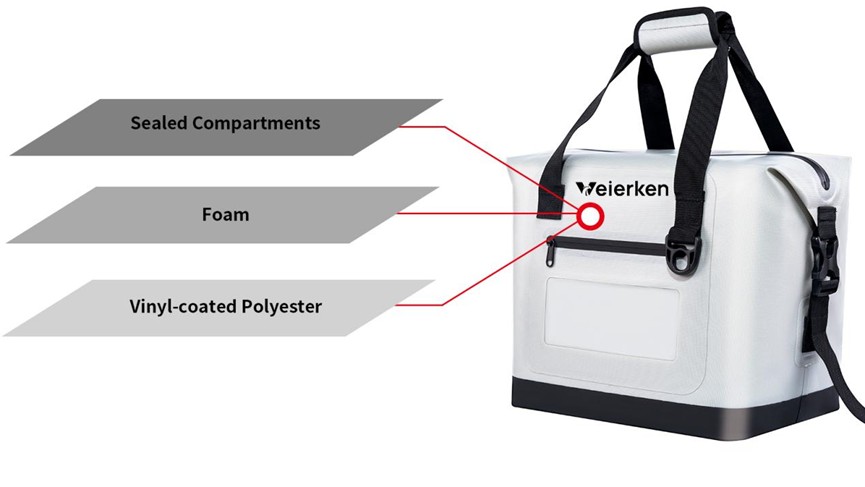
Cooler Bag’s Materials
Uses
Cooler bags excel in:
- Outdoor Adventures:Keeping drinks and food cold during day trips or multi-day excursions such as camping, beach trips, picnics, and other outdoor activities where you need to keep food and drinks cold for several hours or even days.
- Sports Events:Cooler bags are often used at sports events to store cold drinks and snacks for players and spectators.
- Long-Distance Travel:Maintaining food freshness on road trips or flights.
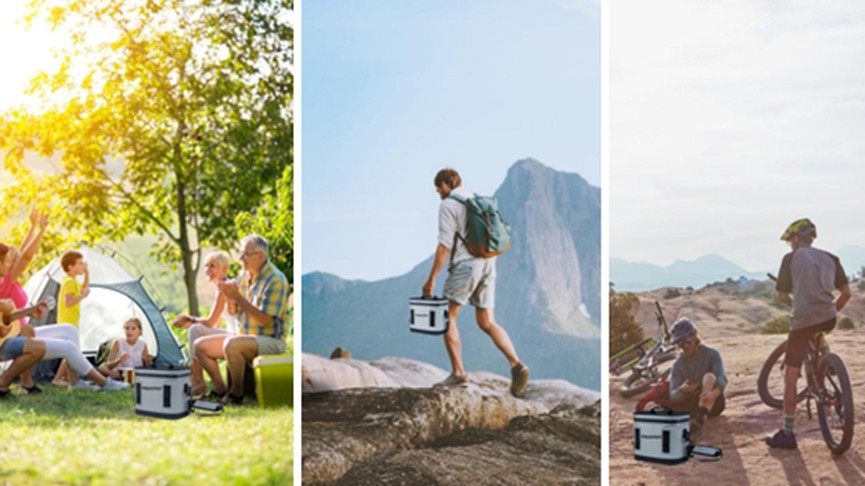
Cooler Bag Different Scenario
Pros:
- Superior insulation for extended periods.
- Designed to prevent leaks and spills.
- Often more durable than thermal bags.
- Can hold larger quantities of food and drinks.
Cons:
- Heavier and bulkier than thermal bags.
- Require ice packs or ice to function effectively.
- Not suitable for keeping hot items warm.
Key Differences Between Thermal Bags and Cooler Bags
Temperature Control Capabilities
Thermal Bags: Suitable for short-term temperature maintenance (a few hours).
Cooler Bags: Ideal for long-term temperature stability (up to several days). Thermal bags are effective for short-term temperature control, typically ranging from one to four hours, depending on the external environment and the bag’s quality. Cooler bags excel in keeping items cold for a prolonged period, typically ranging from several hours to even days, depending on the quality of the bag and the use of ice packs or ice.
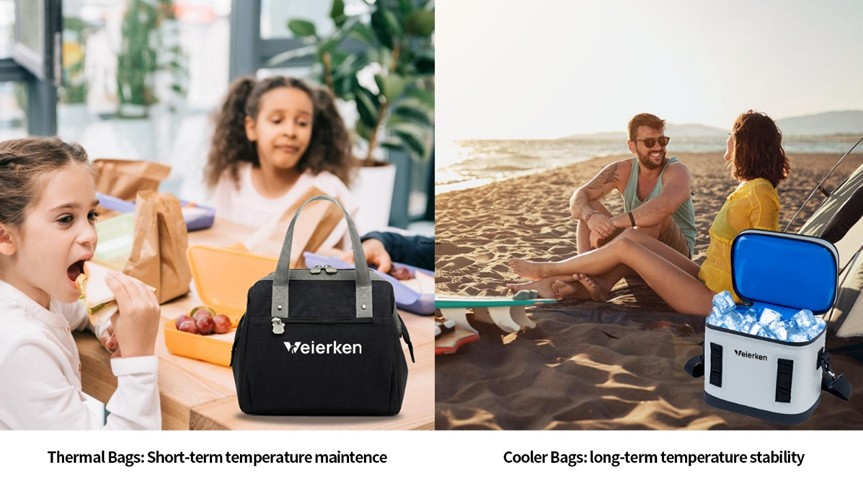
Different Bags used
Size and Capacity
Thermal Bags: Generally smaller and more compact.
Cooler Bags: Larger and capable of holding more items.
In terms of capacity and portability, thermal bags are often smaller and more compact than cooler bags, making them easy to carry and store. Cooler bags, however, are available in a wide range of sizes, from small lunch bags to large, family-sized coolers, offering more storage space but potentially sacrificing portability due to their size and weight.
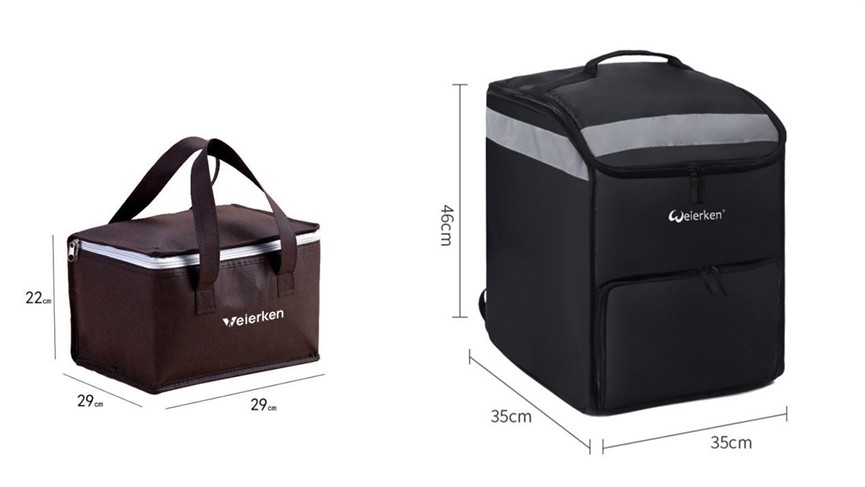
Different Capacity and Size
Durability
Thermal Bags: Designed for everyday use but may not withstand rough handling.
Cooler Bags: Built to last and suitable for rugged environments.
Cooler bags are generally more robust and durable than thermal bags. They are designed to withstand rough outdoor conditions and frequent use, with reinforced seams and heavy-duty materials. Thermal bags, while often made from durable materials, are typically not as rugged and may not hold up as well in demanding environments.
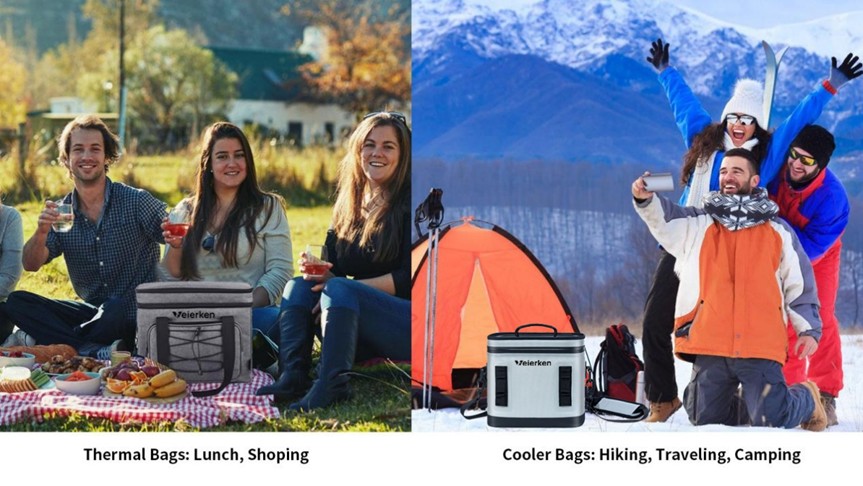
Different Bags used
Choosing the Right Bag for Your Needs
When deciding between a thermal bag and a cooler bag, consider the following factors:
1.Duration of Use: If you need to maintain a specific temperature for a short period, such as during a grocery trip or food delivery, a thermal bag may be sufficient. For longer durations, such as camping trips or beach outings, a cooler bag is more appropriate.
2. Type of Contents: Think about what you will be carrying. If you need to transport both hot and cold items, a thermal bag offers more flexibility. For exclusively cold items, especially perishables, a cooler bag is the better choice.
3.Portability: Consider the size and weight of the bag. If you need something lightweight and easy to carry, especially for daily use, a thermal bag is a good option. If you are planning a longer trip and need to store more items, a cooler bag may be worth the extra bulk.
4. Environmental Conditions: Take into account the external temperature and conditions. Cooler bags are more effective in hot weather or when exposed to direct sunlight for extended periods. Thermal bags are best for mild conditions or when you can minimize exposure to extreme temperatures.
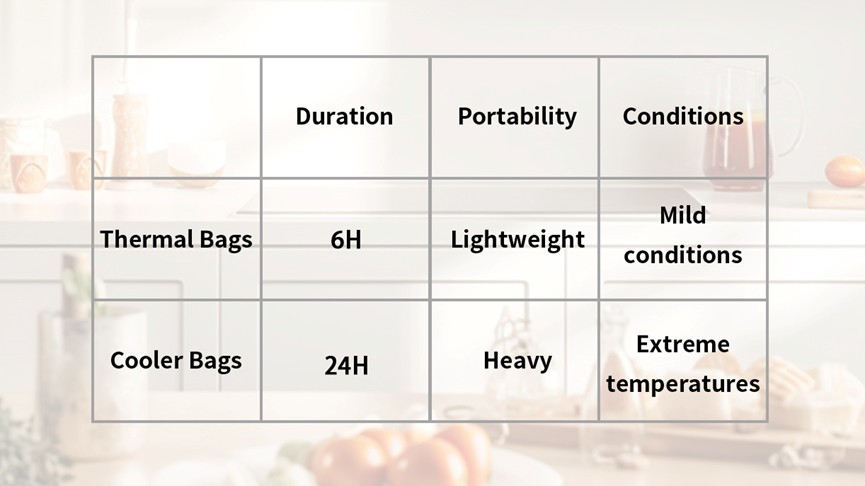
Bags Specification
Conclusion
Understanding the differences between thermal bags and cooler bags is essential for choosing the right bag for your specific needs. While cooler bags and insulated bags may seem similar at first, but both types of bags have their advantages and disadvantages, the choice ultimately comes down to how you plan to use them. When deciding between the two, factors like the duration of use, the volume of items to carry, portability, and the intensity of insulation required should be meticulously weighed. For instance, individuals with active lifestyles who frequently engage in day trips might find thermal bags more convenient, whereas avid campers or those organizing family picnics over the weekend would benefit more from the long-lasting cooling properties of cooler bags. By evaluating these aspects, you can make an informed decision that aligns with your lifestyle and needs. Whether you’re planning a quick picnic or an extended camping trip, choosing the right bag ensures that your food and drinks stay fresh and enjoyable throughout your adventure.


